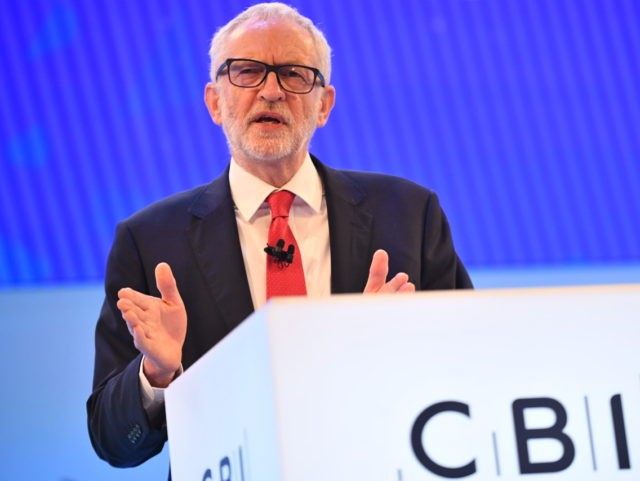Business leaders in the United Kingdom have condemned the socialist policies of Jeremy Corbyn, saying a No-Deal Brexit would be better than a Corbyn led government.
Business leaders at the Confederation of British Industry (CBI) annual meeting this week expressed credulity at leader of the Opposition Jeremy Corbyn’s denial of being anti-business. Despite the CBI’s long history of being against Brexit, many at the conference felt that even a No-Deal Brexit would be preferable than having to endure the Labour Party’s Marxist agenda, according to reports.
Chris Buxton, chief executive of the British Fluid Power Association, told The Mail that: ‘I would rather crash out of Europe with No Deal than elect a Corbyn government. I remember being a child in the 70s, being gathered around a candle waiting for the power to come back on, and we absolutely don’t want to return to that.”
‘But that’s what we’ll get if we stick with Labour’s nationalisation plans”, he concluded.
Farage: Labour Becoming a Corbyn ‘Cult’ Waging ‘Relentless War’ for Hard-Left https://t.co/CGkungVLtN
— Breitbart London (@BreitbartLondon) September 24, 2019
Mark Spragg, managing director of Where Now Consulting, added: “Labour’s policies are from the 1970s. We’re in a changing world. The future has to be with the next generation.”
The 1970s in Britain was a decade marred economically by a rash of nationalisation projects and large levels of government spending, which combined with an oil crisis led to stagflation, high unemployment, and race riots, eventually culminating in the ‘Winter of Discontent’ and the election of the free-market-oriented Margaret Thatcher as Prime Minister.
Leader of the Opposition and self-described socialist Jeremy Corbyn has announced that, if elected, the Labour Party would enact a range of hard-left policies in Britain. Earlier in the week, Corbyn announced that the Labour Party plans to nationalise broadband services, in order to provide “free” fibre-optic broadband to the nation.
Corbyn, who has also proposed schemes to socialise water, rail and mail delivery services, denied that he was “anti-business”, tweeting that: “It’s not anti-business to be anti-poverty pay, it’s not anti-business to want the largest corporations to pay their taxes just as smaller companies do.”
Seize the Means of Education: Labour Backs Abolishing Private Schools, ‘Redistributing’ Their Assets https://t.co/cmU0HLIuPQ
— Breitbart London (@BreitbartLondon) September 23, 2019
Hedge funds in the UK have also taken note of the Labour Party’s far-left shift, and have begun shorting industries and companies that would be at risk were Jeremy Corbyn to take the reins of power. A report from the Financial Mail on Sunday found that over £700 million in shares have been shorted in major businesses that could fall under proposed nationalisation.
Severn Trent and United Utilities, two major British water companies, have had bets totalling £218 million against them and the Royal Mail currently has a £114 million short against it.
The shorts against these industries does not necessarily indicate that the financial sector believes Corbyn will win in next months election, however, those taking shorts out would stand to gain financially if he did.
The impact of Corbyn’s proposals was also felt by BT, which saw it’s share prices fall by as much as 3.7% after the announced plan to socialise the company.
Director general of the CBI, Dame Carolyn Fairbairn, warned that undertaking Corbyn’s socialist project would “crack the foundations of our economy”.
“That will freeze investment. I have talked to businesses who are already sitting there thinking ‘maybe we’re next’. So we do say again to Labour – work with business, work out different answers to these problems. But this programme that is appearing to value none of the contribution that business makes will simply shut investment out of our country”, she said.
Exclusive – Bridgen: Conservatives Shouldn’t Try to ‘Outspend Labour Party Marxists’ https://t.co/2ObVywX1cg
— Breitbart London (@BreitbartLondon) November 2, 2019

COMMENTS
Please let us know if you're having issues with commenting.